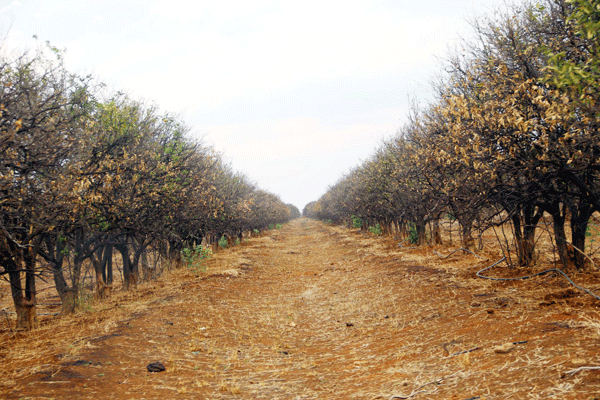
VENDORS in Chegutu have accused former Information deputy minister Bright Matonga of stealing their livelihoods after he ran down Chigwell Estate, a multi-million dollar business that used to produce citrus fruits for export to the Middle East and Europe.
BY BLESSED MHLANGA

Chigwell Estate used to produce enough oranges to sustain the lives of close to 50 fruit and vegetable street vendors in Chegutu and Kadoma and leading supermarkets throughout the year.
The citrus trees at the over 700ha farm are now dry, while shrubs block water canals.
The rich alluvial soils at the farm also used to grow soya beans, maize and wheat, but now not even thorns can survive, 10 years after Matonga took over the farm.
Matonga inherited the estate when it had a plantation of 42 000 orange trees, a state-of-the-art export packing shed, 200 permanent and 300 seasonal workers, but he brought the business down to its knees.
Taurai Machira said for most of his life he had survived by selling oranges grown on the then Thomas Beattie-owned farm, earning himself an average of $10 in profits every day.
“This was all year round my brother, we never ran out of the sweet oranges which we sold on the highway at a $1 per packet; they were sweet, juicy and we would polish them just to attract customers. We called them navo because of their high quality, until Matonga came along,” Machira said.
- Chamisa under fire over US$120K donation
- Mavhunga puts DeMbare into Chibuku quarterfinals
- Pension funds bet on Cabora Bassa oilfields
- Councils defy govt fire tender directive
Keep Reading
For three years running, it has become difficult to find oranges along the streets or supermarkets as the citrus farms have been run down after hostile takeovers.
Stella Magumo who juggles selling airtime, oranges and bottled water is a bitter woman, calling Matonga a thief who stole their livelihoods.
“I sent my children to school with money earned from selling oranges on the highway. In the morning we would go and work at the farm as hired labourers and in the afternoon we would sell oranges but Matonga stole that from us through his greed,” she said.
Even if they get oranges from other places, customers no longer trust Chegutu produce because they fear they could be buying larenges (mixture of oranges and lemons), which had become Matonga’s signature offering from Chigwell.
“He destroyed the market because we have to assure customers that the oranges are not from Matonga’s farm every time we try to sell them,” she said.
However, Matonga remains unapologetic about his classic demonstration of how not to farm which has become an international awe.
Matonga said he was now on the road to stardom and riches because of the exposé published in last week’s edition of The Standard.
“But in all earnest, thank you for that story! My research for this book is progressing from people’s comments! Thank God I don’t have to spend more money on researchers! You gave me an early Christmas present,” he said.
He was referring to his book titled Resettled Farmers and Food Security in Zimbabwe: Current Trends and Debates.
Matonga said the exposé by The Standard on how he failed to tend to the citrus fruit trees, in the process destroying 200 full-time jobs, which cost Zimbabwe annual revenue of $4 million in exports, has in fact improved the value of his book.
“I hope you are gonna do a follow up on that story of mine! It has done wonders for my book sales! It’s now pegged at €70 per copy!
“I have been invited to do lectures in the EU [European Union]and Japan! Keep it up! You were such a blessing in disguise,” he said.
The level at which Matonga reduced a multimillion dollar export producer to a mere forest of dried firewood even got social media users worried.
Alex Magaisa, a constitutional law expert based in the United Kingdom, expressed shock on Twitter, saying a review of the land reform programme was now an urgent matter.
“This Matonga mess is symptomatic of the general malaise on the farms,” he tweeted.
“Denialism doesn’t get us anywhere. Reversal is probably not the correct term.
“It’s reform of so-called reform, to give title and incentives to modernise farming. It’s business.”
Brian Zivavose, who calls himself a victim of political theft, also had a go at Matonga — a doctorate holder in strategic management — saying, “his looting trail started at Zupco where he allegedly fleeced the public transport company big time.”
Matonga’s former wife, Annie who used to manage Chigwell Estate, could not be drawn into commenting on how the ex-Mhondoro-Ngezi legislator ran down the once thriving estate.
“I left that farm when things were fine. I have nothing to do or say about its state. I am not going to discuss anything to do with it,” she said.
Matonga’s workers had a simple explanation of how the former Zanu PF MP made easy the hard task of wilting a tree. “He harvested the fruit which he sold but neglected to feed the golden goose,” said Tonderai Mutora.
“The trees were not watered, they were starved of fertiliser and just basic care. The plantation was turned into a forest, while the boss lived large.”
Owing to the neglect, 12 000 citrus trees were reduced to dead wood only good to light up a fire.
The farm is now being run by a white farmer who only identified himself as Tom and is one of the hundreds of commercial farmers that lost their properties during the chaotic land reform programme.
Tom’s Agri Alliance is trying to rehabilitate 30 000 citrus trees at the farm under a government-sanctioned deal to help revive the citrus business.










